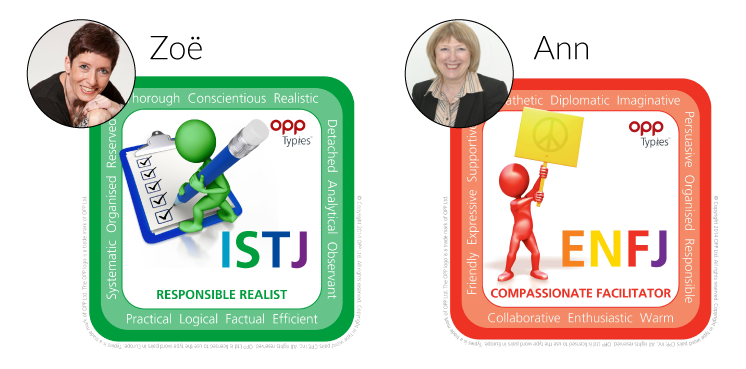In this blog, we have invited Zoë Whitby, a fellow management coach, to talk about the benefits of personality profiling as we both have undertaken this, at different times in our working life. So we both know the benefits of personality profiling and how knowing your type can enhance your performance at work.
Colours, letter combinations, animals, elements, you name it there are many tools on the market that will profile you into some sort of type classification. It’s a bit like the sorting hat of Hogwarts in the Harry Potter books – finding which ‘house’ you were born to belong to gives you a sense of alignment with others of that type, a club to be in. It also highlights the differences you may have from those with different types and this is where it gets interesting.
I first discovered type properly around 10 years ago when a colleague was training on the Myers Briggs Type Indicator tool (MBTI®). It was a turning point for me in my understanding of myself and why certain things came easy to me and others didn’t. I’d agonised through my teens about my difficulty making small talk and my hatred of large social events where I’d much prefer to find a person I knew and stick with them for the duration. The challenge from bosses to be ‘more strategic’ was also explained along with my need to be in control and to have a plan. All of a sudden it was apparent why my communications with some colleagues (in detailed written emails) were welcomed and understood, whereas I struggled to get any response from others.
I’ve since been an advocate of MBTI® and have explored other type tools with interest. While more complex than some, I like MBTI® for its 4-dimension breakdown of type with two choices for each one (like left-handed or right-handed), enabling you to spot opposite preferences in others and thus do some informal ‘typing’ yourself.
And what are the benefits of using type?
In the workplace and our social interactions they are extensive. By identifying your natural preferences you will understand more about:
- The type of work environments you thrive in
- How some colleagues or clients may need something different to you
- The way you naturally prefer to communicate and how you might adjust this to get the best from your communications with those of different types
- How you tend to approach tasks and respond to situations such as crises
- The sort of information you find it easiest to process and why you might need to get/provide a different type of information from/for some colleagues and managers
- Why some people need more praise rather than critique and value relationship building over task completion in the workplace.
For those that know the model, here are our types:

We must not see type as putting us in a box, but more of determining our natural starting point – from where the best of us can stretch our elastic and explore our opposite preferences, knowing that this will take more determination and energy and that we will inevitably be drawn ‘home’, particularly when tired or stressed.
Rather than sticking rigidly to the typical behaviours of our preferred type and seeing those who use different behaviours as wrong, we can do what the intelligent chameleon does and change ourselves to better fit the needs of our environment – the context, task and people we are with. Adjusting even a little to accommodate others’ preferences will reap big rewards.
As Carl Jung, the father of type classification said:
“Everything that irritates us about others can lead us to an understanding of ourselves.”
For more detail read Zoë’s full blog about the MBTI® and how its dimensions affect our work here.

Zoë Whitby is a management coach working with individuals and teams to improve their workplace performance. She also coaches individuals to help them improve their effectiveness and achieve more of their potential in their life and careers. The psychology of type is something that has fascinated her since first undertaking the Myers Briggs Type Indicator test and she has effectively used this to help her coachees understand what makes people tick. www.zwcoaching.co.uk.
If you’d like to discover your MBTI profile and how it can enhance and improve your personal and professional life, please contact Zoë
